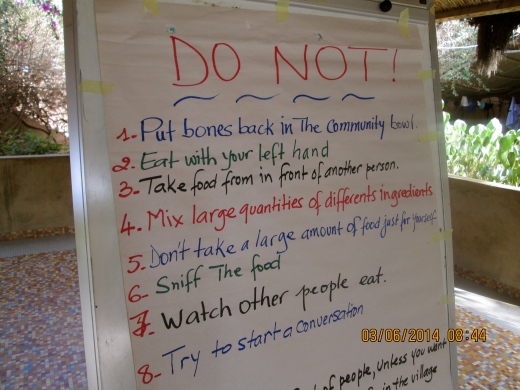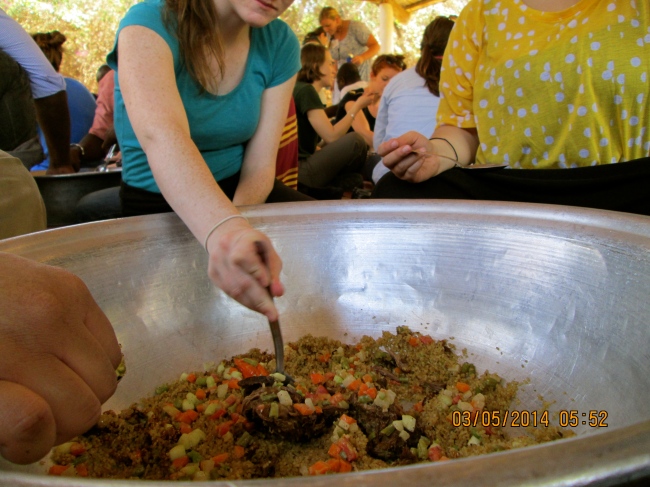7 is significant. In 7 days, God created the world and rested. 7 are the number of days in a week. In the Biblical book of Mark, 7 loaves of bread became 7 baskets of leftovers. It is the jersey number of the San Francisco 49er’s quarterback, Colin Kaepernick. It’s the number of passenger places in a Senegalese 7- seater. It’s the number of Harry Potter books written, the number of continents, the number of colors in the rainbow and the number of rows in the periodic table.
It’s also the number of months my cohort has till we complete our Peace Corps service in Senegal. We know this because we frequent websites like DevNet, LinkedIn, and Devex a few times a week to update our profiles, polish our resumes, look for the latest opportunities. I know this because conversations with my colleagues do not end without someone mentioning phrases like “third year extension”, “going back for more school”, “can’t wait” or “NCE is going to help us. Right?”
It’s almost over.
What was feared, hated, loved. What we looked forward to, what we suffered through, what we endured, what we grew to love and enjoy is now almost over.
Almost. But not yet.
In a frenzy to make the ultimate deadline (sometime in April 2016), my cohort has been working tirelessly to start, complete and/ or evaluate their projects. Everyone who is not on vacation is busy and those on vacation are thinking about how busy they’ll be when they get back. It’s not about us. It never is. It’s about leaving our communities with host country nationals capable enough to continue our work, it’s about paving the way for our replacements, it’s about getting numbers to our bosses, it’s about supporting other volunteers. These are things we’ve done before except now we’re doing twice as much and we must at twice the speed. We’ve learned the language; we know the lay of the land. They’re no more excuses. Time is of the essence.
If there’s anyone who knows this best, it’s me. Having spent the last two and a half months in a state of perpetual limbo, I found out recently that I was rewarded a highly coveted grant from One Acre Fund to support a nutrition project I have called The Sustenance Project. I am not one to deceive myself: this project will ‘monopolize’ the rest of my service. I will have no time for anything else and this is why: The Sustenance Project is designed to address malnutrition in at least 5 villages in my district through the provision of a fortified flour (formula provided by World Vision, ingredients grown locally). A local economic group will be producing the flour, educating people of its benefits primarily for children under 5, and selling it in markets they have researched themselves. It’s called The Sustenance Project for 2 reasons. If it is successful, it will provide sustenance in the form of food to those who consume the flour and sustenance in the form of income to those who make it. The plan is to fight malnutrition and combat poverty. The goal is to get the economic group to a point where they can operate without outside aid- to a point where they can sustain themselves. The economic group, World Vision and One Acre Fund have been excellent partners and we’re all biting our nails, anxious to see how much we can do in 7 months. Our successes will be modeled in World Vision’s larger project later next year and our failures will be noted, evaluated and obviously, avoided.
This is just one example of the many projects my colleagues around the country and I are trying to implement and monitor as we approach the end of our tour. Latrines and clean water systems are being erected in several corners of the country, and projects that have a unique focus on men as partners in health are being planned. Large-scale nutrition, malaria and WASH trainings are being conducted to ensure that health workers, teachers and parents have the capacity to address the critical health issues in their communities.
But we have just 7 months.
7 months to open and close grants, write master’s thesis and reports, collect and share data. To complete action plans, to hold camps and entrepreneurship training courses.
7 months to travel the country. To laugh with the ones who have hosted us for 2 years and labor with those we admire. To dance and feast with one another, to fill out applications for the next adventure, to plan last minute vacations to Europe and East Africa.
7 months of unbearable sun and unforgiving rain.
7 months to attempt to make a difference.
7 more months till we return to the lives we have always know, yet lives we can we can barely remember.
.let us not become weary in doing good, for at the proper time we will reap a harvest if we do not give up.
galatians 6:9












